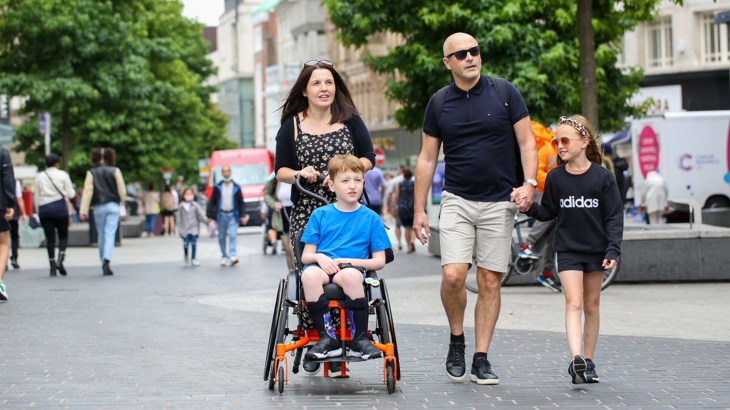Right now, inequalities in life expectancy in England are vast, but the Levelling Up Bill has a chance to change that. Dan Simpson, our Senior Policy and Parliamentary Officer, looks at how the Government can help councils make decisions which improve our health.

Our Walking and Cycling Index found that walking and wheeling prevented 138,000 serious long-term health conditions in the UK in 2021. Photo: Chris Foster
Where I live, the life expectancy is 81. As a rule, people here live nine years less than if they lived a few miles away in Kensington.
In Birkenhead, the average person only lives to 74. That gap is stark, and it’s a scandal.
A lot of this is about our environment.
The buildings, roads and open spaces around us determine how long we live, but also how healthy and happy we are during our life.
At Sustrans, we’ve known this for a while. Our Walking and Cycling Index found that walking and wheeling prevented 138,000 serious long-term health conditions in the UK in 2021.
Where people can’t walk, wheel or cycle some of their journeys easily and safely, they’re missing out.
But this goes beyond active travel.
We need to think big and work together if we’re going to tackle this burning injustice.
Why the planning system matters
Councils make decisions all the time which affect this – for better or worse.
Their role in the planning system is particularly crucial.
They draw up plans for what facilities should be in our area and what requirements they need to meet, and they make decisions on whether to grant planning permission.
They want to make the right decisions, but they can’t always do so.
Councils are overstretched, and by law, they have to consider everything from how many houses are built to how to reduce the risk of floods.
There’s no statutory duty to reduce health inequalities and improve people’s wellbeing, though.
That doesn’t feel right. We should put improving our health and wellbeing at the heart of the planning system.
Our chance to change things
Right now, the planning system is being reformed, with the Levelling Up and Regeneration Bill currently going through Parliament.
With the 34 organisations in the Better Planning Coalition, we want to seize this opportunity.
We’re working with colleagues in all these organisations to put forward an amendment to this Bill.
This amendment would give councils a legal duty and mandate to consider health and wellbeing both when making plans for the whole area and reaching decisions on individual applications.
Health and wellbeing mustn’t be forgotten amid other considerations.
This is particularly important given that this Bill is all about levelling up.
The Bill is supposed to help make different areas of our country more equal in all sorts of ways – from employment opportunities to public transport
Right now, it doesn’t have anything about health, and that’s a big gap.
What better demonstration is there of how unequal our country is than the fact that where you live affects your health?

Sustrans is working with 34 organisations in the Better Planning Coalition to call for councils to consider health and wellbeing in policy and planning.
What would this mean?
There are all sorts of potential outcomes of this new duty for councils.
According to research from Fields in Trust, there are 6.1 million people who have no park or green space within a ten-minute walk.
Wildlife and Countryside Link research found black and minority ethnic people are twice as likely to live in nature-poor neighbourhoods.
A 2016 review by Mireia stated starkly that “living in areas with higher amounts of green spaces reduces mortality”.
That’s why the amendment suggests that councils consider access to nature when they’re deciding whether to approve developments.
Meanwhile, according to a report by Resolution Foundation, living in poor-quality housing makes people twice as likely to have poor general health than those who don’t.
The affordability of housing also affects our health. Professor Marmot’s review linked living in overcrowded or unaffordable housing with depression and anxiety.
This means that if councils don’t enable enough housing to be built or the housing which they allow to be built is bad quality or unaffordable, they’re contributing to our poor health.
The amendment would mean they’d have to consider this.
And, of course, enabling people to walk, wheel or cycle more of their everyday journeys is crucial for our health.
It allows people to exercise as part of their daily lives, not just as a separate activity.
That’s why the UK Chief Medical Officers said “if physical activity were a drug, we would refer to it as a miracle cure”.
From providing safe and convenient routes for walking, wheeling and cycling to ensuring that things like shops, libraries, GPs and schools are close and easy enough to get to without a car, the amendment would influence healthier lifestyles.
What next?
This amendment is going to be debated in the next couple of months, hopefully.
If it passes, it could help improve our neighbourhoods, communities, and health for the better.
We all want to live in a country where everyone has the best chance to live a healthy life.
And so Sustrans and the organisations in the Better Planning Coalition won’t stop pushing until we have a planning system which makes that a reality.
Want to find out more about how we could use the planning system to help people walk or wheel more of their journeys? Read our research into creating walkable neighbourhoods.

About the author
Dan Simpson is Senior Policy and Parliamentary Officer focusing on spatial planning policy, working in the UK-wide Policy and Public Affairs team at Sustrans. He’s previously worked on housing policy for the Archbishop of Canterbury and in public affairs for Alzheimer’s Society.
Connect with Dan on LinkedIn or follow him on Twitter.





